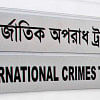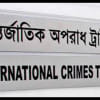Freed Azharul wants prosecution of those involved in war crimes trials

Jamaat leader ATM Azharul Islam yesterday demanded the trial of those involved in the "judicial killings" of party leaders executed for crimes against humanity during the 1971 Liberation War.
"With a heavy heart, I am remembering those who are no longer with us. They were killed unlawfully. They are victims of judicial killing," he said while addressing a rally at Shahbagh.
"All individuals involved in these murders, regardless of their level of involvement, must be brought to justice," he demanded after he was released yesterday, a day after the Supreme Court cleared him of the charges of crimes against humanity during the Liberation War in 1971.
He was freed from the prison cell at Bangladesh Medical University, formerly known as BSMMU, around 9:15am after his release process was completed by the authorities of Dhaka Central Jail in Keraniganj.
Soon after the release, the Jamaat leader joined the rally at Shahbagh intersection.
"After serving nearly 14 years in jail, I have been released today. I am free now... I am a free citizen of an independent country," he said.
He expressed his gratitude to the Supreme Court, his lawyers, participants of the July uprising -- especially the students --members of the army, and the people of the country.
On Tuesday, the Appellate Division of the SC scrapped its earlier judgement that upheld the conviction and death sentence given by the International Crimes Tribunal in 2014.
The apex court also directed the jail authorities to release Azharul immediately unless he is arrested in another case.
On December 30, 2014, the then International Crimes Tribunal-1 sentenced Azhar to death on three charges of crimes against humanity and imprisonment on two other charges.
Azharul was accused of being the commander of the Al-Badr force and president of Chhatra Sangha, the then-student wing of Jamaat-e-Islami, in Rangpur during the Independence War.
However, the apex court, in its latest verdict on May 27, 2025, acknowledged its earlier lapse in properly assessing evidence.
It acknowledged, with a profound sense of judicial responsibility, that in its earlier adjudication, it failed to give due and dispassionate consideration to the evidentiary deficiencies and the broader context in which the allegations of crimes against humanity were framed against the appellant.

 For all latest news, follow The Daily Star's Google News channel.
For all latest news, follow The Daily Star's Google News channel. 







Comments